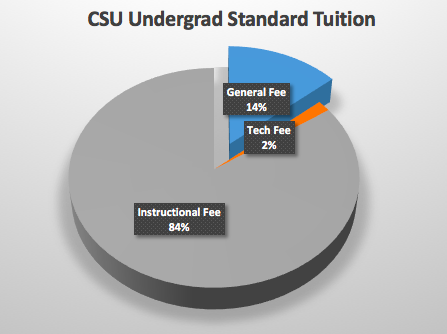By Kourtney Husnick
Students of public universities have a right to know how their tuition money is spent. Cleveland State University students pay $55.40 per credit hour toward a general fee that is built into tuition.
For a full-time undergraduate student, that adds up to $664.80 each semester — at least 12 percent of CSU’s tuition, depending on whether or not students are paying the standard or tuition guarantee rate.
According to the university’s budget book for the 2018-2019 fiscal year, that money totals approximately $19.3 million.
Overseeing a portion of that budget, the General Fee Advisory Committee (GFAC) holds monthly, public meetings to pass their suggestions along to Shannon Greybar Milliken, the interim vice provost and dean of students.
However, sometimes those meetings are not public. Sometimes, like on March 1, 2019, budgeting decisions are made behind closed doors in executive session.
Ohio’s sunshine laws, or freedom of information laws, require all decision-making bodies of all public institutions to “take official action and to conduct all deliberations upon official business only in open meetings unless the subject is specifically excepted by the law.”
As an advisory committee at a public university, GFAC is not exempt from open meetings laws.
In the GFAC meeting minutes from March 1, 2019, the committee “voted to go into executive session to discuss budgetary matters for Fiscal Year 2020.”
However, regardless of the document stating that the move into executive session was “with accordance with the State of Ohio Sunshine Laws,” there is no exemption to open meetings for budgetary matters.
In fact, the committee is required to explicitly state which approved reason it is moving into executive session for in its public meeting minutes, per Ohio Revised Code 121.22. No approved open meeting exemption is included in the meeting minutes for the March 1 meeting.
“I don’t think that [budgeting is] the reason that they went into executive session,” Chava Witt, assistant director of student activities and involvement and GFAC chairperson, said in an interview in March. “Those meeting minutes that are posted will be voted on for approval at our next meeting That might be something that we need to review and potentially update.”
The meeting minutes were approved at the April 5 GFAC meeting with no changes to the executive session details.
“The reason [the meeting minutes] are so short is when you move to executive session, those minutes are not public knowledge,” Heather Shadle, a graduate assistant who takes meeting minutes for GFAC, said during the April 5 committee meeting. “So since you moved to a closed session, that’s why we’re not including those minutes.”
The March 1 GFAC meeting is not the only case where the committee has closed budgeting information off from the public.
The student media sub-committee has no publicly listed meeting dates or meeting minutes, and the Feb. 1, 2019 meeting minutes reference several closed GFAC budget proposal meetings that were required of all committee members to attend.
Ohio’s open meetings law states that “the minutes of a regular or special meeting of any public body shall be promptly prepared, filed and maintained and shall be open to public inspection.”
Additionally, all sub-committees are equally subject to open meeting laws.
Some students who sit on GFAC have mentioned to The Cauldron that decisions were made during executive session and closed meetings as well, regardless of ORC 121.22 specifically stating that “a resolution, rule or formal action of any kind is invalid unless adopted in an open meeting of the public body.”
The law goes as far as invalidating any action “adopted in an open meeting that results from deliberations in a meeting not open to the public” unless the deliberations were made under a specific, authorized exemption from open meetings held in compliance with the law.
“The sunshine laws, to my understanding, don’t cover budgeting necessarily,” Witt said when discussing the topic in March.
Witt also agreed with the students who came forward about decisions being made during the executive session.
“There were motions that were voted on for recommendations [during executive session],” Witt said. “Any recommendation, though, the final decision holder is [Milliken].”
All motions made during GFAC are subject to final approval from Milliken, regardless of when or how they occur.
As GFAC’s January retreat PowerPoint explains, “The Chief Student Affairs Officer holds final authority regarding all GFAC recommendation.”
That same file explains that, “Meetings are open to the public. GFAC members may vote to move to Executive Session with accordance with the State of Ohio Sunshine Laws.”
With executive sessions and closed meetings utilized for budgeting purposes that do not fall under Ohio exemptions for public meetings, it is unknown to the public how many financial decisions have been made regarding the spending of the general fee, whether or not they have already been acted upon or whether or not any corrections to this situation will be made, considering that all of those decisions are invalid under ORC 121.22.
GFAC is the only university committee that specifically looks over the almost $23.2 million general fee budget, and it makes suggestions on how to allocate the roughly $1.6 million of general fee money that goes to Student Affairs.
“We don’t want to violate or misuse the sunshine laws or executive sessions because we’ve done a lot of work to move forward and make these meetings more transparent,” Witt said. “We don’t want to take steps backwards.”
